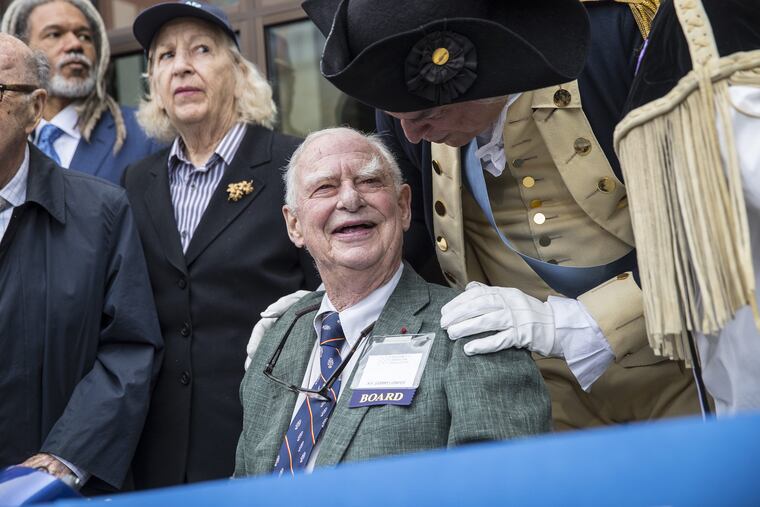Gerry Lenfest was a modern-day Revolutionary | Perspective
With his long-term viewpoint, Gerry left Philadelphia's civic institutions better prepared to guard our free press and our sense of who we are as citizens of a liberal democracy, fragile but enduring.

As someone who has spent most of my life studying the American Revolution, it is clear why creating a museum dedicated to its story was so important to Gerry and Marguerite Lenfest. Not only did Gerry love the city of Philadelphia, the Revolutionary capital of the United States and the place where the nation's seminal documents were written, but his life and character exemplified the Revolution's noblest impulses and its greatest and most far-reaching ideals. If, as the Inquirer recently wrote, "Philanthropy has been for both Lenfests an act of retracing steps and paying back debts," then their gift of a museum dedicated to the nation's origins makes sense as a thank-you to the country and as an acknowledgement of America's foundational Revolutionary principles, which shaped Gerry's extraordinary life.
Like the Revolutionaries, Gerry sought to make a transformative and lasting change to his community and the world. In reflecting on Gerry's passing and the enormous contribution he made to the nation in creating the Museum of the American Revolution, I have come back to a short passage from a Revolutionary-era Boston almanac by printer Nathaniel Ames that I know inspired some of Gerry's effort. "O! ye unborn inhabitants of America," it began, "should this page escape its destined conflagration at the year's end, and these alphabetical letters remain legible – when your eyes behold the sun after he has rolled the seasons round for two or three centuries more, you will know that in Anno Domini 1758 we dreamed of your times."
>> READ MORE: H.F. "Gerry" Lenfest, remembered
Like Ames and the Revolutionaries he so admired, Gerry thought in the long term. He did not wish the gifts he made, and the institution he created, to be judged only by the effect of the current moment or even the outcome in a few years. He thought in terms of generations of impact. He dreamed of leaving, as Washington put it in 1776, for "unborn millions" a legacy that would protect and expand the freedoms that allowed him to live so fully to future generations. In the current landscape of leadership, this is rare, just as it was revolutionary when the founders of the American Republic challenged titled nobility and asserted equality in the Declaration of Independence.
Gerry had faith that the principles of liberal democracy could work for America, and he used his wealth to defend causes he thought bolstered democratic principles. Like the Revolutionaries, Gerry dedicated himself to supporting an informed citizenry as the bulwark of a republic. In this way his commitment to the Museum of the American Revolution and his unique experiment of buying news outlets and donating them to a new non-profit were two halves of the same effort. Americans need to know their past to judge their leadership and understand their obligations in the current moment, and they need credible and fact-based news to act reasonably and deliberately.
>> READ MORE: Gerry Lenfest's lasting legacy: Saving local journalism | Perspective
Gerry leaves us just as the country suffers from political division, attacks on the press, and a withering sense of its own identity as an exceptional nation. With his long-term viewpoint, Gerry left Philadelphia's civic institutions better prepared to guard our free press and our sense of who we are as citizens of a liberal democracy, fragile but enduring. Years from now, wherever America has gone on its Revolutionary experiment, I hope future inhabitants of this country will remember that people like Gerry dreamed of their times.
Dr. Philip Mead is chief historian and director of curatorial affairs for the Museum of the American Revolution. pmead@amrevmuseum.org
The life of H.F "Gerry" Lenfest will be celebrated Oct. 17 at the Academy of Music. The event starts at 11 a.m. (doors open at 9), and advance tickets are not required. The general public is invited. Questions and further information, email: GerryRemembered@lenfestgroup.com.